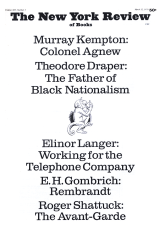This is one of sixty-two new poems of Cavafy, which were among the papers recovered by Cavafy’s Greek editor, George Savidis, several years ago. The papers were in the possession of Alexander Singopoulos, Cavafy’s heir, who has since died. Singopoulos was responsible for bringing out the first collected edition of Cavafy in Alexandria in 1935.
The new poems appeared for the first time in December 1968 in a Greek edition published by Ikaros in Athens. Twenty-one of them, selected by Edmund Keeley and George Savidis, will be published in English translation by Dial Press in the fall of 1970.
My mind moves to distant places.
I’m walking the streets of Elsinore,
through its squares, and I recall
the very sad story:
that unfortunate king
killed by his nephew
because of some fanciful suspicions.
In all the homes of the poor people
secretly (because they were afraid of Fortinbras)
he was mourned. A quiet, gentle man;
a man who loved peace
(his country had suffered much
from the wars of his predecessor).
He behaved graciously towards everyone,
the humble and the great alike.
Never high-handed, he would always seek advice
in the kingdom’s affairs
from serious and experienced persons.
Just why his nephew killed him
was never satisfactorily explained.
The prince suspected him of murder;
and the basis of his suspicion was this:
walking one night along an ancient battlement
he thought he saw a ghost
and with this ghost held a conversation;
what he heard from the ghost supposedly
were certain accusations against the king.
Surely it was a fit of fancy
or an optical illusion
(the prince was nervous in the extreme;
while studying at Wittenberg
many of his fellow students thought him a maniac).
A few days later he went
to his mother’s chambers to discuss
some family affairs. And suddenly,
while he was talking, he lost his self-control
and started shouting, screaming,
that the ghost was there in front of him.
But his mother saw nothing at all.
And that same day, quite unprovoked,
he killed an old gentleman of the court.
Since the prince was due to sail for England
in a day or two,
the king hustled him off posthaste
in order to save him.
But the people were so outraged
by the monstrous murder
that rebels rose up
and tried to storm the palace gates,
led by the dead man’s son
the noble lord Laertes
(a brave young man, and also ambitious;
in the confusion, some of his friends called out:
“Long live King Laertes!”).
Some time later, once the kingdom had calmed down
and the king lay resting in his grave,
killed by his nephew
(the prince never went to England;
he escaped from the ship on his way there),
a certain Horatio came forward
and tried to exonerate the prince
by offering his version of the story.
He claimed that the voyage to England
had been a secret plot, and orders
had been given to kill the prince there
(but this was not clearly ascertained).
He also spoke of poisoned wine—
wine poisoned by the king.
It’s true that Laertes spoke of this too.
But couldn’t he have been lying?
Couldn’t he have been mistaken?
And when did he speak of this?
While dying of his wounds, his mind in a daze,
and seeming to talk deliriously.
As for the poisoned weapons,
it was shown later that the poisoning
had not been done by the king at all:
Laertes had done it himself.
But Horatio, whenever pressed,
would produce even the ghost as a witness:
the ghost had said this and that,
the ghost had done this and that!
Because of all this, though hearing him out,
most people in their hearts
pitied the poor king,
who, with all these ghosts and fairy tales,
was unjustly murdered and disposed of.
Yet Fortinbras, who profited in the end
and so easily won the throne,
gave full attention and weight
to everything Horatio said.
(1899)
This Issue
March 12, 1970



